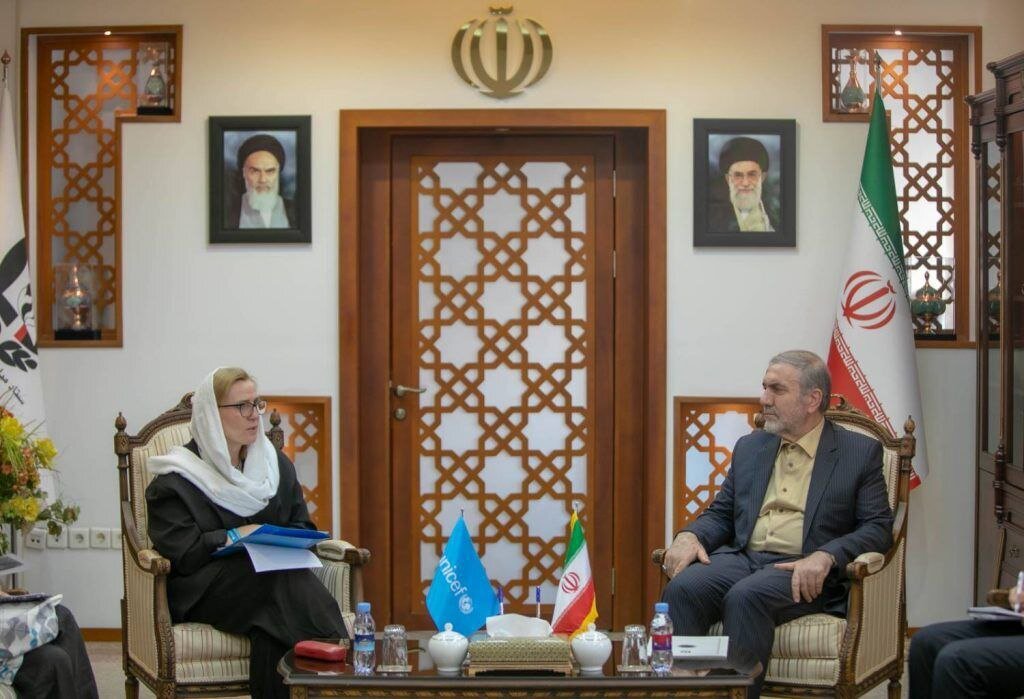Tehran – Brigadier General Hossein Zolfakari, Secretary General of Iran’s Drug Management Headquarters (DCHQ), and Monica Oletzka Neilson, interim AD representative of Iran’s United Nation Children’s Fund (UNICEF), can underscore the need to develop a model of cooperation between the two organizations and increase effectiveness.
At a meeting held on Monday, Zolfakari said the joint efforts could be made more effectively. Additionally, certain feasible state measures need to be taken, the IRNA reported.
Emphasizing existing motivations, capabilities, and general participation in implementing key actions, Zolfaqari said the goal is to provide a platform to further benefit from existing capabilities.
Officials praised UNICEF’s measures in Iran, saying it focuses on training individuals, actively raising children, preventing addiction to prison education centres, improving mental health, strengthening the strength of young people, especially girls, and holding training courses for non-governmental organizations and their managers.
DCHQ and UNICEF quickly published a book on guidelines and protocols for the treatment of addiction, and “we aim to further strengthen our relationship with UNICEF,” Zolfakari further pointed out.
Neilson on her side praised DCHQ’s efforts, saying it was almost impossible to implement these actions without DCHQ’s support. In recent years, UNICEF has adopted a variety of measures to address the health and well-being of young people.
See Maserat or APSWEC (Adolescent Psychosocial Welfare and Empowerment Centre) Program. This helps at-risk adolescents protect themselves, build resilience and practice self-care from social harms such as substance abuse and HIV. Positive results encourage two organizations to expand the implementation of their national programmes as a long-term goal. Developed by DCHQ, the program focuses on prevention, treatment, harm reduction, and the fight against drug invasion and supply.
“One of the most important things that DCHQ can do is to promote coordination of program implementations to improve effectiveness, as the more successful the experience enhances coordination of the experience, the better communication strategies and task implementations can be achieved locally by improving implementation of communication strategies and tasks.
Previous cooperatives
In November 2023, Iran’s Anti-Drug Headquarters and Tehran’s UNICEF office signed a memorandum to launch a joint action plan for the prevention and treatment of substance abuse among teenagers.
The joint action plan was to be implemented between 2023 and 2024. It will be the main foundation for collaboration with UNICEF in the fight against drugs.
The joint activities were to be defined and carried out in cooperation with relevant national agencies, Furs reported.
Previously, several activities have been implemented to prevent and treat substance abuse in adolescents by implementing two joint plans of action.
The establishment of two health and rehabilitation centres for at-risk adolescents in two states of the country known as exemplary centres serving target communities was one of the measures taken in this regard.
In October 2023, UNICEF and Iran’s anti-drug Headquarters worked together with at-risk youth to develop emergency protocols for staff to enhance their ability to address the needs of young people in emergencies. They also held two workshops, UNICEF’s website reported.
These programs allow social workers, professionals, counselors, volunteers and peers to provide much more effective services in the event of an emergency for vulnerable youth, adolescents and their families.
The aim of these workshops was to expand the technical needs of people working with vulnerable and at-risk girls to provide more efficient services in emergencies.
In addition to capacity building on crisis management and professional intervention, the workshop developed protocols for the Adolescent Happiness Centre, supported by UNICEF in Mashhad and Kermansha, to enhance emergency response capabilities.
mt/mg

